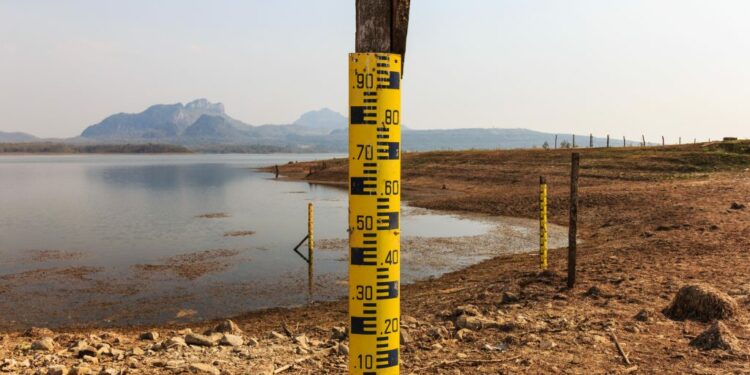Improving efficiency, modernising infrastructure, undertaking institutional reforms, and increasing investments are variables of a formula that can address water security issues in Europe and Central Asia, says the World Bank.
This is the message of the World Bank’s “A Blueprint for Resilience: Charting the Course for Water Security” recent report, urging measures to ensure sustainable water security and deliver significant socio-economic benefits for the region.
Dinara Ziganshina from the Scientific Information Centre of the Interstate Commission for Water Coordination (ICWC) said the most effective strategy to mitigate the impacts of such shortages would be to reshape the economy so that it relies less on water.
“The next best option is to improve how water is supplied and used. This involves improved water governance, better technologies, infrastructure upgrades, and awareness raising. All this requires a renewed culture of valuing water,” she told Euractiv.
Addressing vulnerabilities
The World Bank identifies Central Asia as one of the most vulnerable regions, with significant economic and environmental challenges from water stress. Countries in Europe are also endangered, such as Czechia, Hungary, Moldova, Poland and Ukraine.
Ziganshina said the countries of Central Asia are building resilience through structural/infrastructure transformations, lining canals, modernising pumping stations and other infrastructure, advancing non-structural measures and nature-based solutions.
Extreme weather events are expected to increase due to climate change, worsening water availability and flood risks. Financial losses from flooding already amount to $64 billion annually – the South Caucasus area is the most economically exposed.
At the same time, drought hazards are also expected to increase significantly, particularly in Central Asia and the South Caucasus, threatening lives, livelihoods, and infrastructure.
Ageing and inefficient water supply systems exacerbate the issue, leading to high water losses. Forty-four per cent of water is lost on average, and under half of collected wastewater is treated.
The estimated annual cost to achieve water security and meet water-related Sustainable Development Goals (SDGs) by 2030 is $77 billion. The report suggests encouraging private investment to address this gap.
Plenty of water, plenty of challenges
Albania, as one of the countries studied in the report, has abundant water resources with low water stress but faces various risks and challenges in economic water productivity and water management.
Key sectors reliant on water include hydroelectricity (which accounts for 97 per cent of the total domestic production), agriculture, and tourism, a prospective sector with huge potential for economic growth.
Ami Kozeli, Deputy Minister of Infrastructure and Energy, spoke to Euractiv about the reforms the country is implementing to align with EU standards in modernising water supply and sanitation through utility consolidation and partnerships with the World Bank.
Integrated Water Resource Management (IWRM) principles guide these efforts, supported by River Basin Management Plans and legislative harmonisation with the EU Water Framework Directive.
Regional warning systems
Albania is increasingly exposed to the impacts of climate change and poor management practices. An average of 2.4 per cent of the population in Albania is annually affected by floods, with significant GDP losses.
The economic loss caused by floods is estimated at $2.3 billion, so the Albanian government, as well as governments in the Western Balkans region, must focus on modernising information systems to enhance water resource monitoring.
Kozeli mentioned the regional warning system implemented partially for the Drin-Buna river basin, which aims at expanding collaboration between four partner countries: Albania, Kosovo, Montenegro, and North Macedonia.
“The Government of Albania is assessing the possibility to have national plans in place to deal with flood emergencies. We are very much aware of the relevance of effectively managing information related to flood risk between different authorities,” he told Euractiv.
Transboundary water management
Given the shared nature of water resources in the Western Balkans, Kozeli highlighted the need for neighbouring countries to foster trust and collaborate in managing these resources equitably.
Measures include establishing institutional mechanisms like joint water management commissions, transparent data-sharing systems, and cross-border monitoring. Kozeli also discussed learning from global best practices and leveraging international organisations’ expertise in supporting these efforts.
“As Albania, we remain committed to working with our regional partners to develop sustainable, fair, and effective solutions for managing our shared water resources,” Kozeli concluded.
[Edited By Brian Maguire | Euractiv’s Advocacy Lab ]
Source link : http://www.bing.com/news/apiclick.aspx?ref=FexRss&aid=&tid=6760960130fb4b66848097d35b51aae2&url=https%3A%2F%2Fwww.euractiv.com%2Fsection%2Feet%2Fnews%2Feurope-central-asia-under-pressure-to-modernise-water-security-infrastructure-reports-world-bank%2F&c=6677047047279024461&mkt=de-de
Author :
Publish date : 2024-12-16 12:51:00
Copyright for syndicated content belongs to the linked Source.


